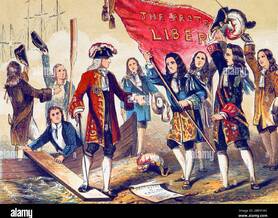-
The Glorious Revolution
A) Click on the link to watch the video and answer the questions of part A on the worksheet "The Glorious Revolution"
Télécharger « The Glorious Revolution 3 minute history »
B) Read the text on the "Bill of Rights" and answer the questions of part B on the worksheet
What’s in the Bill of Rights?
The English Bill of Rights includes the following items:
- A list of King James’s misdeeds
- 13 articles that outlined specific freedoms
- Confirmation that William and Mary were rightful successors to the throne of England
In general, the Bill of Rights limited the power of the monarchy, elevated the status of Parliament and outlined specific rights of individuals.
Some of the key liberties and concepts laid out in the articles include:
- Freedom to elect members of Parliament, without the king or queen’s interference
- Freedom of speech in Parliament
- Freedom from royal interference with the law
- Freedom to petition the king
- Freedom to bear arms for self-defense
- Freedom from cruel and unusual punishment and excessive bail
- Freedom from taxation by royal prerogative, without the agreement of Parliament
- Freedom of fines and forfeitures without a trial
- Freedom from armies being raised during peacetimes
Other important provisions were that Roman Catholics couldn’t be king or queen, Parliament should be summoned frequently and the succession of the throne would be passed to Mary’s sister, Princess Anne of Denmark and her heirs (than to any heirs of William by a later marriage).
Constitutional MonarchyThe English Bill of Rights created a constitutional monarchy in England, meaning the king or queen acts as head of state but his or her powers are limited by law.
Under this system, the monarchy couldn’t rule without the consent of Parliament, and the people were given individual rights. In the modern-day British constitutional monarchy, the king or queen plays a largely ceremonial role.
Collège Jacques Prévert - Les Arcs sur Argens -


